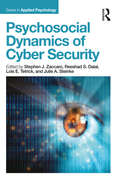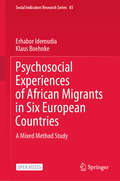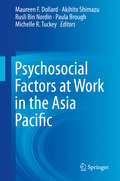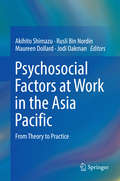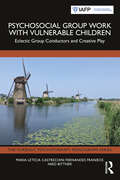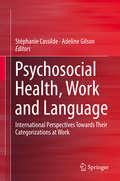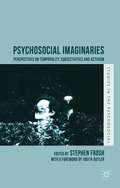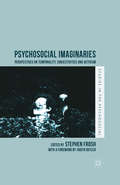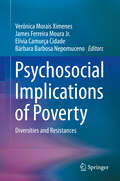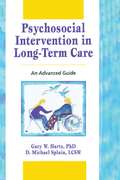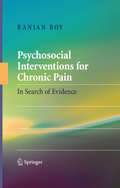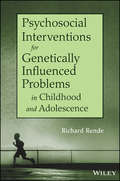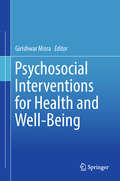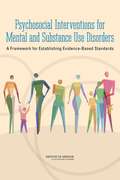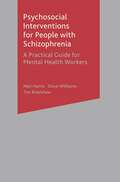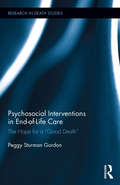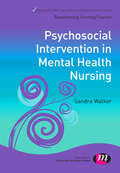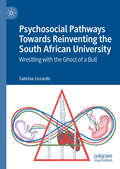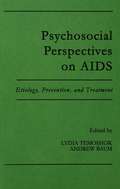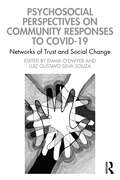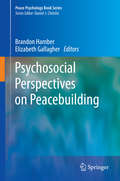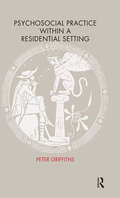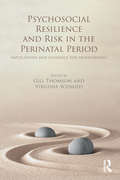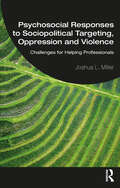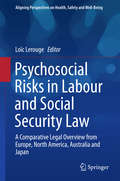- Table View
- List View
Psychosocial Dynamics of Cyber Security (Applied Psychology Series)
by Lois E. Tetrick Reeshad S. Dalal Julie A. Steinke Stephen J. ZaccaroThis new volume, edited by industrial and organizational psychologists, will look at the important topic of cyber security work in the US and around the world. With contributions from experts in the fields of industrial and organizational psychology, human factors, computer science, economics, and applied anthropology, the book takes the position that employees in cyber security professions must maintain attention over long periods of time, must make decisions with imperfect information with the potential to exceed their cognitive capacity, may often need to contend with stress and fatigue, and must frequently interact with others in team settings and multiteam systems. Consequently, psychosocial dynamics become a critical driver of cyber security effectiveness. Chapters in the book reflect a multilevel perspective (individuals, teams, multiteam systems) and describe cognitive, affective and behavioral inputs, processes and outcomes that operate at each level. The book chapters also include contributions from both research scientists and cyber security policy-makers/professionals to promote a strong scientist-practitioner dynamic. The intent of the book editors is to inform both theory and practice regarding the psychosocial dynamics of cyber security work.
Psychosocial Experiences of African Migrants in Six European Countries: A Mixed Method Study (Social Indicators Research Series #81)
by Klaus Boehnke Erhabor IdemudiaThis open access book provides an empirical account of the psychological and social experiences of 3500 African migrants to 6 European countries: Germany, Spain, Italy, The Netherlands, France, and the UK. It discusses the psychosocial motivations for migration from Africa, who migrates where, and stressful pre- and post-migration factors affecting the social and psychological wellbeing of migrants. The book also includes a detailed exploration of posttraumatic stress disorder (PTSD) and posttraumatic stress symptoms (PTSS) among African migrants. Addressing and offering solutions to pre- and post-migration problems in Africa and Europe as well as the problems associated with the perilous journeys involved, this unique study is a must-read for anyone interested in cross-cultural psychology and social science, and particularly in migration and mental health.
Psychosocial Factors at Work in the Asia Pacific
by Maureen F. Dollard Akihito Shimazu Rusli Bin Nordin Paula Brough Michelle R. TuckeyThe past several decades of rapid organizational change and global economic activity beseech a fresh understanding of work conditions and mental health across all nations and regions. This volume addresses psychosocial factors at work, legislation, frameworks, research innovations and common perceptions in the Asia Pacific countries. It presents new research on psychosocial factors at work from an Asia Pacific perspective, introducing exciting new research on workaholism, bullying, work-life balance and conflict, work demands classifications, and psychosocial safety climate. Insights regarding workplace psychosocial factors, worker health and well-being have evolved mainly within North American and European cultural contexts and developed industrial countries. This state of the art account of knowledge development in the Asia Pacific region will stimulate new insights for researchers and policy makers to improve the quality of workers' lives worldwide. "This very informative book highlights the significance and uniqueness of job stress problems encountered by workers of different countries in the Asia Pacific region. Occupational health researchers all around the world will find this book a great inspiration for future research. " Yawen Cheng, ScD, Institute of Health Policy and Management, Taiwan "Initiatives and interventions reported from collaborative projects present useful hints for filling gaps in policies and practices for managing psychosocial risk factors in diverse work-life situations in the Asia Pacific region". Dr. Kazutaka Kogi, President, International Commission of Occupational Health
Psychosocial Factors at Work in the Asia Pacific
by Akihito Shimazu Rusli Bin Nordin Maureen Dollard Jodi OakmanThe past several decades of rapid organizational change and global economic activity beseech a fresh understanding of work conditions and mental health across all nations and regions. This volume addresses psychosocial factors at work, legislation, frameworks, research innovations and common perceptions in the Asia Pacific countries. It presents new research on psychosocial factors at work from an Asia Pacific perspective, introducing exciting new research on workaholism, bullying, work-life balance and conflict, work demands classifications, and psychosocial safety climate. Insights regarding workplace psychosocial factors, worker health and well-being have evolved mainly within North American and European cultural contexts and developed industrial countries. This state of the art account of knowledge development in the Asia Pacific region will stimulate new insights for researchers and policy makers to improve the quality of workers' lives worldwide. "This very informative book highlights the significance and uniqueness of job stress problems encountered by workers of different countries in the Asia Pacific region. Occupational health researchers all around the world will find this book a great inspiration for future research. " Yawen Cheng, ScD, Institute of Health Policy and Management, Taiwan "Initiatives and interventions reported from collaborative projects present useful hints for filling gaps in policies and practices for managing psychosocial risk factors in diverse work-life situations in the Asia Pacific region". Dr. Kazutaka Kogi, President, International Commission of Occupational Health
Psychosocial Group Work with Vulnerable Children: Eclectic Group Conductors and Creative Play (ISSN)
by Maria Leticia Castrechini Fernandes Franieck Niko BittnerPsychosocial Group Work with Vulnerable Children presents a simple, accessible, and preventative approach to psychotherapeutic interventions.The authors explore how this form of group work can strengthen resilience and prevent an increase in antisocial behavioural tendencies among children. Based on a process of shared meaning communication, the book explains how professionals can help children to engage in in-group creative play and allow them to experience their self in relation to others. Castrechini-Franieck and Bittner draw on their experiences of working with children in groups, supplemented with therapeutic elements from Gestalt therapy and ontological psychoanalysis. This approach helps children to achieve a stable state of emotional well-being while improving their behaviour at school, along with their social skills.Psychosocial Group Work with Vulnerable Children will be a key reading for psychotherapists and other professionals working with vulnerable children including psychologists, psychiatrists, and social workers.
Psychosocial Health, Work and Language
by Stéphanie Cassilde Adeline GilsonThis volume deals with the construction of categorizations of health at work on the basis of individuals' perceptions and analyses of the psychosocial health effects at their work. The volume approaches the subject from the point of view of those who have experienced psychosocial risks at work, either by being under constraints themselves or by being witness to such constraints. Each chapter sheds light on their representations by examining how the individuals label these constraints. The book compares official categorizations of psychosocial health effects of work to unofficial categorizations, built or expressed. It shows how taking into account subjective narratives may reinforce existing strategies. By giving a central place to language in the analysis of the representations of psychosocial health at work, the volume provides additional information about the various prevention and coping strategies that can be used for dealing with the issue. Beyond some international comparisons, the book covers various national case studies, including in Argentina, Belgium, Canada, Chechnya, France, Germany, the Netherlands, Japan, and Russia.
Psychosocial Imaginaries: Perspectives on Temporality, Subjectivities and Activism (Studies in the Psychosocial)
by Stephen FroshPsychosocial Imaginaries.
Psychosocial Imaginaries: Perspectives on Temporality, Subjectivities and Activism (Studies in the Psychosocial)
by Stephen FroshPsychosocial studies challenges the traditions of psychology and sociology from a genuinely transdisciplinary perspective. The book reflects this agenda in its varied theoretical and empirical strands, producing a newly contextualised and restless body of understanding of how 'psychic' and 'social' processes intertwine.
Psychosocial Implications of Poverty: Diversities and Resistances
by Verônica Morais Ximenes James Ferreira Moura Jr. Elívia Camurça Cidade Bárbara Barbosa NepomucenoThis book presents a multidimensional, psychosocial and critical understanding of poverty by bringing together studies carried out with groups in different contexts and situations of deprivation in Brazil, Mexico, Paraguay, Nicaragua and Spain. The book is divided in two parts. The first part presents studies that unveil the psychosocial implications of poverty by revealing the processes of domination based on the stigmatization and criminalization of poor people, which contribute to maintain realities of social inequality. The second part presents studies focused on strategies to fight poverty and forms of resistance developed by individuals who are in situations of marginalization.The studies presented in this contributed volume depart from the theoretical framework developed by Critical Social Psychology, Community Psychology and Liberation Psychology, in an effort to understand poverty beyond its monetary dimension, bringing social, cultural, structural and subjective factors into the analysis. Psychological science in general has not produced specific knowledge about poverty as a result of the relations of domination produced by social inequalities fostered by the capitalist system. This book seeks to fill this gap by presenting a psychosocial perspective with psychological and sociological bases aligned in a dialectical way in order to understand and confront poverty. Psychosocial Implications of Poverty – Diversities and Resistances will be of interest to social psychologists, sociologists and economists interested in multidimensional studies of poverty, as well as to policy makers and activists directly working with the development of policies and strategies to fight poverty.
Psychosocial Intervention in Long-Term Care: An Advanced Guide
by Gary W Hartz D Michael SplainThe responsibility of providing mental health evaluations and treatment to nursing home patients is increasingly falling on the shoulders of social services and nursing staff. Psychosocial Intervention in Long-Term Care provides the advanced techniques you, as a caregiver, need for assessing and intervening with psychosocial and behavioral problems in LTC. Targeted to students and staff who are familiar with the basic needs and problems of LTC residents, this book also describes effective ways of documenting assessments and interventions to help you integrate results into the medical record and prepare for state surveys. Psychosocial Intervention in Long-Term Care presents you with information about common mental disorders in LTC, basic counseling techniques, and the three major types of psychiatric medication. You’ll also read about legal issues in the psychosocial arena and learn how to avoid burnout while working in LTC. Best of all, this book shows you how to: use the Geriatric Depression Scale and the Mini Mental Status Exam to screen for depression and dementia design thorough behavioral assessments through use of a tracking grid use results of assessments to set up effective behavioral interventions intervene with specific psychosocial problems, such as aggression document the results of assessments develop effective Resident Assessment Inventories prepare for state surveys and develop plans of correction in response to surveysWhether you’re a graduate student or new practitioner in social work, nursing, or health care administration, you’ll appreciate this book’s practical, hands-on approach to problem solving and its focus on the biopsychosocial model. Only through a thorough assessment of residents’physical, psychological, and social needs can we design effective intervention and provide the care they deserve.
Psychosocial Interventions for Chronic Pain
by Ranjan RoyThis book fills a major gap in the practice literature for healthcare professionals engaged in providing psychosocial care for their patients suffering from chronic pain or illness. Up to now there has been little published material on evidence-based medicine in this field. Roy's book at last provides empirically derived support and understanding of psychosocial problems and explores the efficacy of the interventions available for patient care. A boon for clinical psychologists.
Psychosocial Interventions for Genetically Influenced Problems in Childhood and Adolescence
by Richard RendeHow to weigh genetic factors while choosing the bestpsychosocial interventionsPsychosocial Interventions for Genetically InfluencedProblems in Childhood and Adolescence explores empiricallysupported psychosocial interventions in light of our currentunderstanding of the genome. It considers how interventions may bemodified and enhanced as the products of genomic research continueto expand - and why they offer the most promise for makingsubstantial gains in treatment and prevention.Providing a clear, accessible assessment of our currentknowledge, both of the genome and evidence based treatments,Psychosocial Interventions for Genetically Influenced Problemsin Childhood and Adolescence provides practical advice toclinicians,policy makers, and others invested in treating youngpeople who present with a variety of conditions including anxiety,depression, ADHD, autism, substance abuse, and dyslexia. Rendediscusses the current understanding of genetic etiology ofpsychopathology, and explores the support, or lack thereof, forvarious modes of treatment in light of new genomic knowledge. Theoverall premise is that our advances in genetics will be put tobest therapeutic use by fueling translational psychosocialinterventions.Key points raised include:The need for treating children suffering today, rather thanwaiting for a biological "magic bullet"Discussion of how empirically-supported interventions mesh withgenetic vulnerabilitiesWays in which interventions may change as genetic researchcontinues
Psychosocial Interventions for Health and Well-Being
by Girishwar MisraThis volume provides multifaceted and multidisciplinary insights into the growing field of health studies. Providing inputs from the behavioural sciences as well as social sciences, it discusses the issues of recovery from illness, and growth and wellbeing, as situated in social and eco-cultural contexts, and addresses the modalities of health-related interventions in diverse contexts. The specific themes taken up by the contributors are post-trauma growth, resilience, gender and health, distress and wellness, indigenous healing, counselling and psychotherapy, disability-related interventions, self-healing, as well as health issues of special groups like adolescents and the elderly, cancer patients and those suffering from other chronic illnesses. Till recently, the medical model has prevailed as the chief form of understanding health and illness. This has led to marginalization of the context, localization of all health and wellness components within the individual, and to biological reductionism. The contributions to this volume propose corrective measures and provide diverse approaches in a balanced manner. This volume is useful for researchers and practitioners interested in health studies, including the behavioural sciences, social work, medical anthropology, and public health.
Psychosocial Interventions for Mental and Substance Use Disorders: A Framework for Establishing Evidence-Based Standards
by Mary Jane EnglandMental health and substance use disorders affect approximately 20 percent of Americans and are associated with significant morbidity and mortality. Although a wide range of evidence-based psychosocial interventions are currently in use, most consumers of mental health care find it difficult to know whether they are receiving high-quality care. Although the current evidence base for the effects of psychosocial interventions is sizable, subsequent steps in the process of bringing a psychosocial intervention into routine clinical care are less well defined. Psychosocial Interventions for Mental and Substance Use Disorders details the reasons for the gap between what is known to be effective and current practice and offers recommendations for how best to address this gap by applying a framework that can be used to establish standards for psychosocial interventions. The framework described in Psychosocial Interventions for Mental and Substance Use Disorders can be used to chart a path toward the ultimate goal of improving the outcomes. The framework highlights the need to (1) support research to strengthen the evidence base on the efficacy and effectiveness of psychosocial interventions; (2) based on this evidence, identify the key elements that drive an intervention's effect; (3) conduct systematic reviews to inform clinical guidelines that incorporate these key elements; (4) using the findings of these systematic reviews, develop quality measures - measures of the structure, process, and outcomes of interventions; and (5) establish methods for successfully implementing and sustaining these interventions in regular practice including the training of providers of these interventions. The recommendations offered in this report are intended to assist policy makers, health care organizations, and payers that are organizing and overseeing the provision of care for mental health and substance use disorders while navigating a new health care landscape. The recommendations also target providers, professional societies, funding agencies, consumers, and researchers, all of whom have a stake in ensuring that evidence-based, high-quality care is provided to individuals receiving mental health and substance use services.
Psychosocial Interventions for People with Schizophrenia
by Williams Steve Harris Tim Neil BradshawMental health care for people experiencing schizophrenia has changed dramatically over the last twenty years. This book draws on the expertise of a group of experienced clinical practitioners to provide an up-to-date understanding of this condition, and a practical guide to implementing evidence-based psychosocial interventions for people with schizophrenia. Written in a clear and accessible format, this book -covers the historical, social and political perspectives which give meaning to the current position of mental health care -includes up-to-date interventions framed within the context of peoples lives -describes how these interventions translate into specialist areas of practice Using a variety of clinical examples, this text provides a clear overview of schizophrenia, and serves as a comprehensive, practical guide to the understanding, treatment and management of this mental condition.
Psychosocial Interventions in End-of-Life Care: The Hope for a “Good Death” (Research in Death Studies #1)
by Peggy Sturman GordonThe concept of a "good death" has been hotly debated in medical circles for decades. This volume delves into the possibility and desirability of a "good death" by presenting the psychosocial measures of care as a crucial component, such as religion, existentialism, hope and meaning-making. The volume also focuses on oncologic psychiatry and the influence of technology as a means to alleviate pain and suffering, and potentially provide relief to those at the end of life. Such initiatives are aimed at diminishing pain and are socially bolstering and emotionally comforting to ensure a peaceful closure with life as opposed to a battle waged. Utilizing the most recent information from medical journals and books to present the latest on healthcare and dying today, this volume crosses the boundaries of thanatology, psychology, religion, spirituality, medical ethics and public health.
Psychosocial Interventions in Mental Health Nursing (Transforming Nursing Practice Series)
by Sandra WalkerIn order to give high quality care it is essential that mental health nurses have a solid grasp of the most common therapies and interventions used in mental healthcare. If nurses understand what the various interventions involve then they will be much better equipped to support patients through their recovery. This is a practical, engaging introduction to the major psychosocial interventions that demonstrates to students what the interventions are, why they are important and how they can be used. Key features - Interactive approach through realistic case studies that show how interventions can work to promote recovery - A patient centred approach considers the social as well as psychological aspects of mental healthcare - Each chapter is mapped to the relevant NMC standards and Essential Skills Clusters so that readers can see how they are meeting their professional requirements - Activities throughout challenge the reader to think critically and develop graduate skills
Psychosocial Pathways Towards Reinventing the South African University: Wrestling with the Ghost of a Bull
by Sabrina LiccardoThis book proposes a conceptual-empirical framework for exploring forms of continuity and change along psychosocial pathways in South African universities. It illustrates how the psychosocial pathways are grounded in the symbolic narratives and knowledges of young scientists, engineers and architects - all interlocutors in the research from which this book is based. Alala, Mamoratwa, Welile, Odirile, Kaiya, Amirah, Takalani, Nosakhele, Naila, Ambani, Khanyisile, Itumeleng, Ethwasa and Kgnaya provide collective standpoints in the multiplicities within and between the lived lives and told stories of young Black South African women in Science, Technology, Engineering, and Mathematics (STEM) fields. In doing so, this compelling work advances possibilities for demythologising scientific endeavour as a white male achievement and shifting knowledge communities across gendered, racialised, class and national divides.This book presents an innovative narrative methodology, utilising the myth of the Minotaur to examine the state of the university at the heart of the hierarchical labyrinth in “post”-apartheid South Africa. Throughout the work the author wrestles with and self-reflexively highlights her own positionality as a white, middle-class South African woman to examine how this affects the production of this research in ways which serve to preserve the colonial knowledge system. With the rise of the Rhodes Must Fall and Fees Must Fall student movement in South Africa, demanding for the fall of institutionalised racial hierarchies, the author uses the cover image of narrative formations in the spirit of exploration to think with and through undulating networked forms that could possibly forge new psychosocial pathways towards decolonising and reinventing South African universities. This work offers a unique conceptual and methodological resource for students and scholars of psychosocial and narrative theory, as well as those who are concerned about the politics of higher education, both in South Africa and in other contexts around the world.
Psychosocial Perspectives on Aids: Etiology, Prevention and Treatment
by Andrew Baum Lydia TemoshokAIDS and the virus that causes it have challenged the world's scientists, health care systems, and public health policies as much or more than any medical problem in recorded history. Perhaps this is so because this particular infirmity constitutes more than a merely medical problem: it is enmeshed in psychological, social, cultural, political, and economic contexts. This book examines the need for pragmatic and research-based suggestions on how to address some important problems related to these contexts. Although much basic research in virology and immunology can be accomplished within the biomedical domain, biobehavioral disciplines such as behavioral medicine offer more opportunities for the comprehensive approach necessary to confront the AIDS/HIV problem. The editors of this groundbreaking volume suggest that the very nature of this constantly evolving problem encourages an approach to research and intervention/prevention efforts that emphasizes flexibility of response to changing knowledge, patterns of the pandemic, new treatments, and shifts in public opinion and behavior. A major triumph in dealing with this phenomenon would include a bridging of the gap between research and applied efforts, which has been the largest obstacle for progress to date. In this book, such previously uncharted territory is explored, opening a host of new possibilities for dealing with the very real threat of AIDS.
Psychosocial Perspectives on Community Responses to Covid-19: Networks of Trust and Social Change
by Emma O’Dwyer Souza, Luiz Gustavo SilvaThis highly topical edited book documents the community response to Covid-19 across national contexts, exploring the widespread development and mobilisation of community initiatives and groups. It provides rich analysis of case studies from the Global North and South, including South Africa, the USA, India, China, Mexico, Brazil, Italy, Australia, the UK, Turkey, and Argentina. The Covid-19 pandemic motivated a significant community response globally, with the widespread development and mobilisation of "bottom up" community initiatives and groups. These community responses were an essential yet often unseen and unrecognised means by which people survived the pandemic. This book asks questions such as how were community responses to Covid-19 shaped by national, cultural and political processes and phenomena; how did community responses to Covid-19 interact with public policies, on health, education, and social welfare; and what are the likely political implications of the community response to Covid-19? Discussing the provision of abortion care in Latin America, the support to marginalized communities in Kolkata, and the mobilisation of carnival "krewes" in New Orleans, to give a few examples, the text adopts and develops a novel socio-cultural psychological approach, weaving together contributions from scholars working in diverse disciplinary fields. The text highlights the importance of integrating multiple levels of analysis, including psychological, sociological, and political/ideological, to investigate how communities respond to crises such as the Covid-19 pandemic, and how they can plan for and manage future crises. This is essential reading for academics and students in psychology and the social sciences, as well as policy-makers, charities, and third-sector organisations.
Psychosocial Perspectives on Peacebuilding
by Brandon Hamber Elizabeth GallagherThe book Psychosocial Perspectives on Peacebuilding offers a template for those dealing with the aftermath of armed conflict to look at peacebuilding through a psychosocial lens. This Volume, and the case studies that are in it, starts from the premise that armed conflict and the political violence that flows from it, are deeply contextual and that in dealing with the impact of armed conflict, context matters. The book argues for a conceptual shift, in which psychosocial practices are not merely about treating individuals and groups with context and culturally sensitive methods and approaches: the contributors argue that such interventions and practices should in themselves shape social change. This is of critical importance because the psychosocial method continually highlights how the social context is one of the primary causes of individual psychological distress. The chapters in this book describe experiences within very different contexts, including Guatemala, Jerusalem, Indian Kashmir, Mozambique, Northern Ireland, South Africa and Sri Lanka. The common thread between the case studies is that they each show how psychosocial interventions and practices can influence the peacebuilding environment and foster wider social change. Psychosocial Perspectives on Peacebuilding is essential reading for social and peace psychologists, as well as for students and researchers in the field of conflict and peace studies, and for psychosocial practitioners and those working in post-conflict areas for NGO's.
Psychosocial Practice within a Residential Setting (The\cassel Hospital Monograph Ser.)
by Peter GriffithsThe Cassell Hospital Monograph Series, No. 1. The first in a series of monographs, intended to present accessible teaching material concerned with the practice of residential care.
Psychosocial Resilience and Risk in the Perinatal Period: Implications and Guidance for Professionals
by Gill Thomson Virginia SchmiedBringing together experts in the field, this important book considers the underlying risk factors that create situations of psychosocial vulnerability and marginalisation for mothers, from their baby’s conception up to a year after birth. Adopting a strengths-based approach, the book looks not only at the incidence and impact of disadvantageous circumstances on women but also explores protective factors at an individual, family, community and service level. It identifies promising evidence-based interventions and sources of resilience. With a distinctive focus on social and cultural diversity, Psychosocial Resilience and Risk in the Perinatal Period considers a wide range of personal circumstances and social groups, including women’s experiences of traumatic birth, domestic and family violence, drug and alcohol use and mothering by indigenous, same-sex and disabled women. Throughout, case studies and service user experiences are used to illuminate the issues and illustrate exemplary care practice. International in scope, this book is particularly strong on the implications for care practices and health service delivery within Western models of maternity care. Its applied focus and evidence base makes it eminently suitable for study purposes and professional reference. Of relevance to midwives, health visitors and other health and social care practitioners, Psychosocial Resilience and Risk in the Perinatal Period’s final chapters focus on developing resilience amongst professionals and multiprofessional and interagency working.
Psychosocial Responses to Sociopolitical Targeting, Oppression and Violence: Challenges for Helping Professionals
by Joshua L. MillerThis book will prepare social workers, psychologists, and counselors for psychosocial work with individuals and groups who are experiencing distress and trauma resulting from historical and current sociopolitical oppression and violence. Sociopolitical oppression is a sustained, systematic catastrophe, which results from social targeting and discrimination such as racism, sexism and misogyny, homophobia, and anti-immigrant fervor. The consequences are profound and debilitating. In some ways, they are similar to reactions to a single event disaster (e.g., hurricane, earthquake, terrorist attack) but even more insidious because the social targeting and harassment have been ongoing and will continue. As a guide for direct clinical practice, this book offers new models for understanding the nature and consequences of sociopolitical disasters as well as guiding a range of interventions – clinical, psychoeducational, advocacy, and social justice – for use on a micro, mezzo, and macro level. Drawing on indigenous and BIPOC knowledge and scholarship and using case studies from around the world, it criticizes while also adapting and integrating knowledge and theory from the fields of disaster mental health, psychosocial capacity building, trauma therapy, psychodynamic theory, cognitive behavioral theories, and theories of resilience and positive psychology, linking them to an understanding of historical and social oppression, social justice, and intergroup conflict and reconciliation. The book offers critiques of dominant Western, Eurocentric visions of personhood and models of intervention and questions assumptions about the roles of "client" and "worker," proposing more egalitarian, collaborative relationships and extensive use of training of trainers. It will prepare graduate students and practitioners across the helping professions for work that promotes the collective and individual strength and efficacy of affected people, while also responding directly to vulnerability, stress, and trauma.
Psychosocial Risks in Labour and Social Security Law
by Loïc LerougeThis book studies a range of legal systems and compares them on their ability to deal with psychosocial risks at work. The book looks at prevention of psychosocial risks from a labor law perspective and at compensation and reparation from a social security law perspective. It pays special attention to the topic of bullying in the work place, which is currently the subject of most legal summons.This book presents the views on the subject from leading national and international experts and provides an in-depth coverage of legal systems used in Southern and Northern European countries, as well as Canada and Japan to deal with this topic. The topic of psychosocial risks at work has received much attention recently, both from the general public, the press, and those working in the legal arena. It is difficult for lawyers to deal with the issue of psychosocial risks at work due to the multifactorial and subjective features involved.
